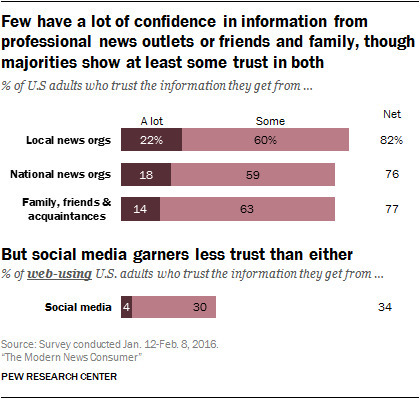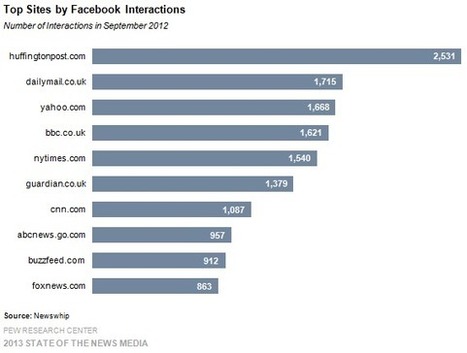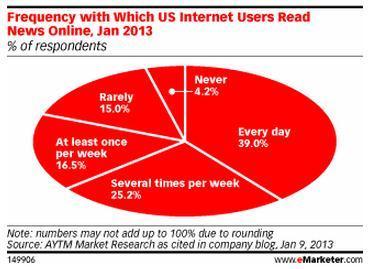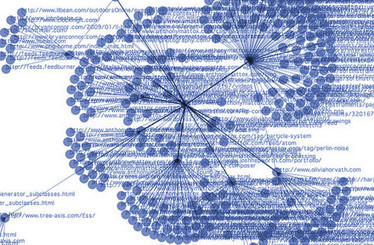 Your new post is loading...
 Your new post is loading...
Digital news continues to evolve, pushed by a variety of innovations in recent years, from groundbreaking new technologies like virtual reality and automated reporting to experiments on social platforms that have altered campaign coverage. As journalists and media practitioners gather for the annual Online News Association Conference, here are 10 key findings from recent Pew Research Center surveys and analyses that show how these rapid digital shifts are reshaping Americans’ news habits...
New media companies -- from Gawker to Buzzfeed -- have sprung up to feed every niche (and then some). Which are actually profitable? FORTUNE -- The web has given rise to a number of notable digital publishers serving almost everyone's tastes, from straightforward news to guilty pleasures. For every Pulitzer-winning 10-part series on wounded war veterans, there are just as many frothy posts like the "10 funniest cat GIFs of the week." What about earnings? Some like The Awl have been profitable from the outset; others like Vox Media predict they'll be in the black soon. Here's a snapshot of just several new media businesses and how they're doing....
For a time, Gabrielle Giffords was dead. So was Newtown, Connecticut, shooter Adam Lanza’s father. Or maybe it was his brother in Hoboken, New Jersey. All three, as we now know, are alive. Two of them weren’t even shot. On the other hand, the alleged Boston Marathon bomber is, actually, under arrest. Then he wasn’t. Then he was. How does the news get it so wrong? I’ve spent almost 20 years as a reporter and anchor and have covered more live, fast-breaking stories than I remember. Mistakes happen regularly on cable news because of the inexact and unreliable nature of rolling coverage. But most of the mistakes don’t matter: the exact color of the car, the exact price of the stock, the exact quote from the courtroom. Ultimately, they all get corrected, as rumor and speculation give way to provable fact and hard evidence. Most of the mistakes end up being of little consequence. But the details surrounding the Boston bomber mattered, because the nation was so heavily invested. Americans were on edge, their sense of safety shattered again. Public anxiety was at its height when the news of an arrest first came. The news, it turns out, was wrong. And this one didn’t fix itself....
There is much talk of paywalls at the moment, but don't forget the other side of the payfence: there is a huge opportunity in ad-supported free media and MailOnline is showing the way forward. Print is still hugely important to DMG as a whole - but the company expects digital revenue to exceed print by 2015, which will be quite a milestone. Mail Newspapers MD Guy Zitter stresses this is in a context of revenue growing overall, not shrinking, as this slide from the investor briefing shows....
When Facebook introduced its redesigned News Feed, it did more than change how people view memes and photos of cats — it altered the way stories are seen. Now everyone can make news. But for those who make a living by spreading news, Facebook has changed the way stories are presented. Dean Praetorius, a senior editor with The Huffington Post, talked with AllFacebook about how the way news is presented on Facebook requires some changes to the traditional approach. The Huffington Post has recently been lauded for its popularity on Facebook. Pew Research Center presented findings regarding news and social media, citing a study by Newswhip showing that the online newspaper was by far the most engaged news source on Facebook. In terms of Facebook interactions, HuffPost beat out more traditional companies, such as The Daily Mail, The New York Times, and CNN. How did HuffPost accomplish this? Praetorius said that the company has taken a well-rounded approach to social media, knowing that the story is far from completed when it’s published. HuffPost also thinks about stories differently from print media outlets and TV stations. Praetorius said that stories on the site are meant to generate conversation, and not so much to simply inform, as an old-school newspaper would...
More than half of Americans watch news clips and broadcasts online—and 37% say they watch less cable TV news than they previously did. Cord-cutting and increased mobile usage play significant roles in news consumption via the internet.
|
News organizations are experimenting increasingly with robot journalism, using computer programs to transform data into news stories, or news stories into multimedia presentations.
Most uses of robot journalism have been for fairly formulaic situations — company earnings reports, stock market summaries, earthquake alerts and youth sports stories. But inevitably, news companies will be testing automatic news writing on more challenging subjects.
What are the ethics of robot journalism? When editors consider using automated news writing, what issues of accuracy, quality and transparency arise?
The media industry may be hurting, but journalism -- and access to information -- is flourishing. Journalists may just have to work smarter, and network more, to keep up.... Journalism is not in crisis. The media industry — and journalists — might be, but the journalism itself is actually improving. Such is the argument made by international documentary filmmaker Bregtje van der Haak and Annenberg professors Michael Parks and Manuel Castells in a recently published article about “Networked Journalism.” As the authors see it, the problem is that most of the doomsayers mix the concept of journalism with the business of journalism. In their article, journalism is defined as the “production of reliable information and analysis needed for the adequate performance of a democratic society.” Not mentioned in the definition are “profits,” “professional journalists” or “traditional publishers.” Just the pursuit of reliable information....
Traditional news organizations need to embrace the disruption brought by digital culture -- or they risk becoming obsolete. That was the message late last week at the International Symposium on Online Journalism hosted by the Knight Center for Journalism in the Americas at the University of Texas at Austin, where about 370 of the world's journalists, researchers and media watchers grappled with the hard questions for a beleaguered traditional media industry that is now more than a decade into its disruptive transformation. The problem is many media companies view digital technologies through a lens of traditional journalism and thus, fail to strategize properly, said Clark Gilbert, president and CEO of Deseret News Publishing Company. "In a post-disruption world, why would people pick up a paper at all? Why would someone turn on the 10 o'clock newscast?" Gilbert asked. "If you are not asking those fundamental questions, there is not a future for you legacy organization." The key to surviving? Innovate. Fail. Innovate again....
WorldStream, the Journal's stream of brief videos built on Tout, is getting premium ad rates and substantial audience numbers. The text-based web is dead, says Michael Downing. When AOL CEO Tim Armstrong announced his intention this month to transform the company into a platform for video, Downing heard a death knell — one he’s been expecting for some time. We are, after all, as he says, on the precipice of “the rise of the visual web.” Downing has a dog in this fight; he’s the founder of Tout, a video sharing website and app that makes it easy for users to upload and share short — under 15 seconds — videos in real-time. Although originally designed as a consumer device, it also appealed to publishers: The Wall Street Journal approached Downing with the idea for a proprietary app that reporters could use as a news gathering tool. With the addition of some analytics tools and a centralized management function that allows editors to quickly vet clips before they’re published, that became WorldStream, which we wrote about in August....
The grizzled vet and the digital native: Journalism has plenty of room for both to succeed. I spent eight years at AOL and I'll say this: I saw none of the great, all of the bad and some of the good. ... The blood sport during my AOL days was about the future of media companies — who would or wouldn’t survive the digital onslaught. Actually, it was much the same during my time at Newsweek in the 80s (who needed three newsweeklies in a broadcast world). Ditto when I joined The New York Times in the 70s (was the city big enough for both The Post and Daily News). Now, the social Web with its echo chamber turns up the volume daily — and makes it more personal, too. It’s far more about the fate of the individual journalist. That quickly gets down to the paycheck. Will there be one? How much? Who gets it — the “professional” or the pretender? Consumer demand for credible news and information is greater than ever. The problem is the 100-year-old model for producing it is forever broken. That’s why more attention must be paid to finding new ways to produce quality journalism — efficiently, at scale and at a price supported by mobile CPMs, which at best are 50% lower than desktop CPMs, which if you’re lucky come in two-thirds lower than print CPMs. In other words, a high-cost newsroom structure built for the print age will never work in a smartphone or tablet world. A few startups are experimenting with new models — Vox Media, Machinima, Bleacher Report and Storify are a few that I follow. Among traditional media companies, FORBES is the only one I know of charting a new course....
|



 Your new post is loading...
Your new post is loading...




















Pew Research provides valuable insight into the changing digital news landscape. rrecommended reading for PR, journalists and marketers. 9/10